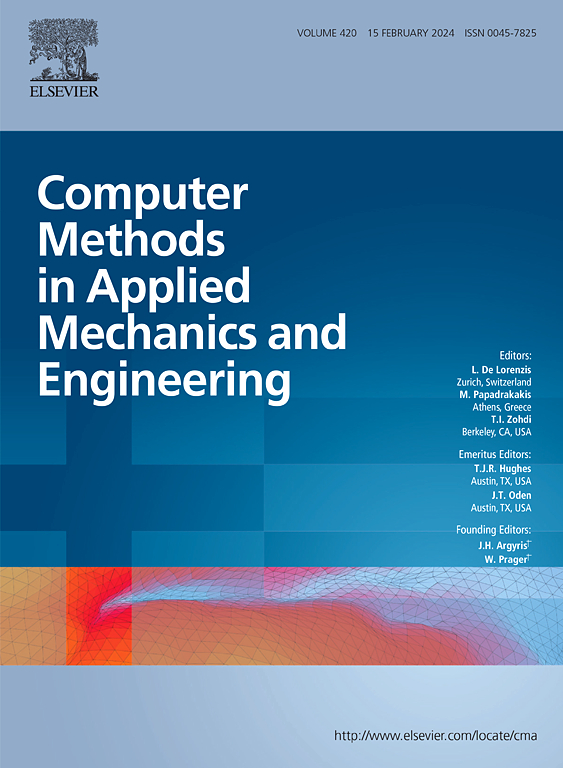快进量子优化算法:收敛性与新型无约束优化的研究
IF 7.3
1区 工程技术
Q1 ENGINEERING, MULTIDISCIPLINARY
Computer Methods in Applied Mechanics and Engineering
Pub Date : 2025-05-15
DOI:10.1016/j.cma.2025.118039
引用次数: 0
摘要
快速前向量子优化算法(Fast Forward Quantum Optimization Algorithm, FFQOA)是一种新型的量子启发启发式搜索算法,它从与量子粒子相关的波函数的运动和位移活动中获得灵感。该算法在预测时间序列、生物医学图像聚类和优化卷积神经网络性能方面表现出显著的有效性。然而,对于FFQOA在标准优化测试函数上的收敛行为和性能,目前还没有全面的研究。在这一差距的激励下,我们在三个重要的方向上扩展了我们的研究。首先,通过研究其波函数的局部和全局位移,分析了FFQOA的收敛性。为此,利用鞅理论对位移序列进行分析,建立了达到FFQOA全局收敛状态的充分必要条件。其次,我们引入了20个新的无约束优化测试函数,称为Singh优化函数。对这些函数的数学性质进行了严格的推导和全面的讨论。最后,利用这些优化函数,对FFQOA的性能进行了评估,并与成熟的元启发式算法(包括遗传算法、模拟退火算法、文化算法、粒子群算法、蚁群算法、萤火虫算法和灰狼优化器)进行了比较。我们的分析表明,大多数现有算法在迭代的早期阶段难以有效地平衡探索和利用,通常无法实现全局收敛。相比之下,FFQOA不仅满足全局收敛准则,而且能够一致地识别所提出的Singh优化函数的全局最优解。[源代码:本研究的源代码可通过[email protected], [email protected]与作者联系获取。]本文章由计算机程序翻译,如有差异,请以英文原文为准。
The Fast Forward Quantum Optimization Algorithm: A study of convergence and novel unconstrained optimization
The Fast Forward Quantum Optimization Algorithm (FFQOA) is a novel quantum-inspired heuristic search algorithm, drawing inspiration from the movement and displacement activities of wavefunctions associated with quantum particles. This algorithm has demonstrated remarkable effectiveness in predicting time series, clustering biomedical images, and optimizing the performance of convolutional neural networks. However, there has been no comprehensive study to investigate the convergence behavior and performance of FFQOA on standard optimization test functions. Motivated by this gap, we extend our research in three significant directions. First, we analyze the convergence behavior of FFQOA by studying the local and global displacements of its wavefunctions. To achieve this, martingale theory is employed to analyze the sequence of displacements, and we establish a necessary and sufficient condition for attaining the global convergence state of FFQOA. Second, we introduce 20 novel unconstrained optimization test functions, termed the Singh optimization functions. The mathematical properties of these functions are rigorously derived and comprehensively discussed. Finally, leveraging these optimization functions, the performance of FFQOA is evaluated and compared against well-established metaheuristic algorithms, including the Genetic Algorithm, Simulated Annealing, Cultural Algorithm, Particle Swarm Optimization, Ant Colony Optimization, Firefly Algorithm, and Grey Wolf Optimizer. Our analysis reveals that most existing algorithms struggle to effectively balance exploration and exploitation in the early stages of iterations, often failing to achieve global convergence. In contrast, FFQOA not only satisfies the global convergence criteria but also consistently identifies the global optimal solutions for the proposed Singh optimization functions. [Source Code: The source code for this study is available upon request by contacting the author via emails at [email protected], [email protected]].
求助全文
通过发布文献求助,成功后即可免费获取论文全文。
去求助
来源期刊
CiteScore
12.70
自引率
15.30%
发文量
719
审稿时长
44 days
期刊介绍:
Computer Methods in Applied Mechanics and Engineering stands as a cornerstone in the realm of computational science and engineering. With a history spanning over five decades, the journal has been a key platform for disseminating papers on advanced mathematical modeling and numerical solutions. Interdisciplinary in nature, these contributions encompass mechanics, mathematics, computer science, and various scientific disciplines. The journal welcomes a broad range of computational methods addressing the simulation, analysis, and design of complex physical problems, making it a vital resource for researchers in the field.

 求助内容:
求助内容: 应助结果提醒方式:
应助结果提醒方式:


